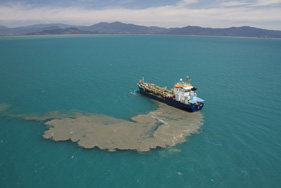Barrier reef may not die – dumping & megaport restricted

UNESCO puts Australian government ‘on 18 months probation’ to improve protection, end dumping and restrict megaport expansion
Australia must deliver "effective and sustained protection" of the reef from threats including reckless industrialization and pollution, UNESCO said.
UNESCO’s World Heritage Committee has voted to maintain pressure on Australia to deliver on its promise to restore the health of the Great Barrier Reef. The Australian government is required to provide a first report on progress in just 18 months.
The committee welcomed Australia’s "commitment to establish a permanent ban on dumping of dredged material from all capital dredging projects within the property" and to restrict new megaport expansions in and near the reef. Following this decision, WWF expects a full ban on dumping in the reef’s World Heritage waters to come into force within months.
"This vote by UNESCO’s World Heritage Committee demonstrates that green advocacy works: the Australian government is now effectively on probation over the protection of the Great Barrier Reef. For this amazing place to flourish again, governments and businesses alike have a crucial role to play. We will be watching progress and continue to protect this and other natural World Heritage sites," said David Nussbaum, Chief Executive of WWF-UK.
On Sunday, WWF delivered signatures from people in 177 countries to the UNESCO committee asking it to firmly defend our shared natural heritage when it comes under threat.
"Australia has promised to prioritize the health of the reef over damaging activities like dumping dredge spoil. UNESCO will be watching to ensure that the condition of the reef improves in coming years, as will the 550,000 WWF campaign supporters and millions of people worldwide who are deeply concerned and want to see a stop to industrial destruction of the Great Barrier Reef," said Marco Lambertini, Director General of WWF International.
In its final reef decision, the committee expressed continued concern that habitats and wildlife populations have declined, and that the reef’s overall outlook is poor. The committee emphasized that major long-term threats such as water pollution and climate change remain and require action.
Australia is requested to "rigorously implement all of its commitments in order to halt the current documented declines," the committee decision says. The country must report back to UNESCO on its progress by December of next year and again three years later in order to demonstrate "effective and sustained protection" of the reef.
"Water pollution and climate change remain major threats to the health of the Great Barrier Reef, and WWF will work tirelessly to ensure that action is taken to preserve and repair this remarkable marine ecosystem," said WWF-Australia CEO Dermot O’Gorman. "Today’s World Heritage decision will keep the pressure on Australia to turn promises into real action and results. We must bring back the corals, the turtles, the dugongs – the natural wonders of the reef."
Valere Tjolle
@ValereTjolle
You’ve done the work now get the benefits – make your green destination visible HERE
See how a green destination can work on a FAM trip HERE
 United Kingdom
United Kingdom United States
United States Asia Pacific
Asia Pacific












































BA suspending all Heathrow to Abu Dhabi flights
Unexpected wave rocks cruise ship
Report: Cruise guest died after ship lashed in heavy storm
British teen in serious condition after paraglider collision
JetBlue scraps London Gatwick flights